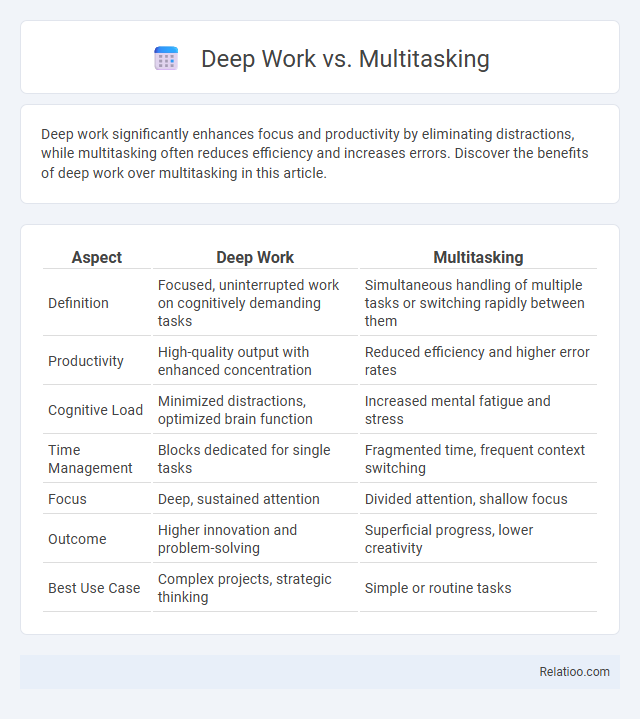Deep work significantly enhances focus and productivity by eliminating distractions, while multitasking often reduces efficiency and increases errors. Discover the benefits of deep work over multitasking in this article.
Table of Comparison
| Aspect | Deep Work | Multitasking |
|---|---|---|
| Definition | Focused, uninterrupted work on cognitively demanding tasks | Simultaneous handling of multiple tasks or switching rapidly between them |
| Productivity | High-quality output with enhanced concentration | Reduced efficiency and higher error rates |
| Cognitive Load | Minimized distractions, optimized brain function | Increased mental fatigue and stress |
| Time Management | Blocks dedicated for single tasks | Fragmented time, frequent context switching |
| Focus | Deep, sustained attention | Divided attention, shallow focus |
| Outcome | Higher innovation and problem-solving | Superficial progress, lower creativity |
| Best Use Case | Complex projects, strategic thinking | Simple or routine tasks |
Understanding Deep Work: Definition and Principles
Deep work involves engaging in cognitively demanding tasks without distractions, enabling maximum focus and productivity. Unlike multitasking, which divides attention and reduces efficiency, deep work promotes intentionality by prioritizing meaningful and uninterrupted work periods. You can enhance your cognitive performance and output by adopting the principles of deep work, such as time blocking, minimizing external interruptions, and committing to sustained concentration.
What is Multitasking? A Closer Look
Multitasking refers to performing multiple tasks simultaneously, often leading to divided attention and reduced cognitive efficiency. Research shows that frequent multitasking can impair memory retention and slower task completion compared to focused efforts. In contrast, deep work emphasizes uninterrupted concentration, enhancing productivity and skill development through intentional, distraction-free sessions.
Productivity: Deep Work vs Multitasking
Deep work, characterized by focused and uninterrupted engagement on cognitively demanding tasks, significantly boosts productivity by enhancing concentration and reducing errors. Multitasking, often involving frequent task-switching, diminishes efficiency and increases cognitive load, leading to lower quality outcomes and longer completion times. Intentionality in task management prioritizes deep work over multitasking, aligning effort with goals to maximize productive output and cognitive performance.
Cognitive Benefits of Deep Work
Deep work significantly enhances cognitive capabilities by promoting intense concentration and reducing distractions, which leads to improved problem-solving skills and memory retention. Unlike multitasking, which fragments attention and decreases overall productivity, deep work fosters neural plasticity and strengthens mental resilience. Intentionality during deep work sessions optimizes brain function, enabling complex learning and creativity while minimizing cognitive fatigue.
The Pitfalls and Costs of Multitasking
Multitasking significantly reduces productivity by causing frequent task-switching, which leads to cognitive fatigue and increased errors. You lose focus and depth of understanding, as the brain struggles to allocate resources effectively, resulting in lower-quality outcomes compared to deep work. Intentionality in focusing on one task at a time helps avoid these pitfalls, enhancing concentration, creativity, and overall efficiency.
Focus and Attention Span: Key Differences
Deep work enhances focus and attention span by fostering uninterrupted, high-concentration periods that improve cognitive performance and task mastery. Multitasking significantly diminishes attention span, causing frequent task-switching that leads to reduced productivity and increased cognitive fatigue. Intentionality involves deliberately directing focus toward meaningful tasks, optimizing attention allocation and reinforcing sustained concentration necessary for deep work.
Impact on Creativity and Problem Solving
Deep work enhances creativity and problem-solving by enabling sustained, distraction-free focus, which fosters complex idea generation and in-depth analysis. Multitasking fragments attention, reducing cognitive capacity and leading to superficial processing that hinders innovative thinking and effective problem resolution. Intentionality sharpens focus by aligning efforts with clear goals, optimizing mental resources for creative breakthroughs and strategic problem-solving outcomes.
Time Management Strategies Compared
Deep work maximizes productivity by focusing intensely on cognitively demanding tasks without interruption, enhancing output quality and efficiency. Multitasking often reduces effectiveness due to frequent task-switching, which increases cognitive load and errors, undermining time management benefits. Your intentionality in prioritizing tasks and minimizing distractions strengthens focus, enabling better allocation of time to high-impact activities for improved overall performance.
Which Approach Boosts Career Growth?
Deep work dramatically enhances your career growth by enabling sustained, high-quality output that sharpens expertise and drives innovation. Multitasking, while common, often fragments your attention, diminishing productivity and cognitive performance essential for advanced skill development. Intentionality underpins deep work by aligning your focus with meaningful goals, ensuring each task contributes effectively to your professional advancement.
Choosing the Right Method: Deep Work or Multitasking
Choosing between deep work and multitasking depends on your task complexity and desired outcomes. Deep work maximizes focus and productivity by minimizing distractions, ideal for complex tasks requiring creativity and critical thinking. Multitasking suits simpler, repetitive tasks but often reduces overall efficiency and cognitive performance compared to intentional deep work sessions.

Infographic: Deep work vs Multitasking
 relatioo.com
relatioo.com